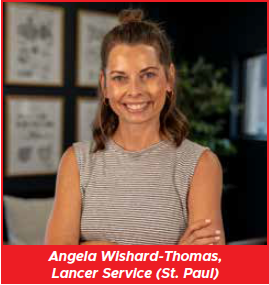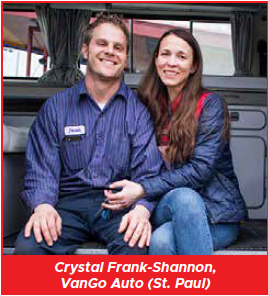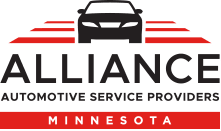Bringing New Skills to the Table: Women in Shops
Not too long ago, it was extremely rare to see a woman working in a repair shop – mechanical or collision – but these days, more women are changing careers and lending their unique skill sets to the automotive industry.
With backgrounds in a variety of fields, these ladies bring unique insights and perspectives to their businesses.
Angela Wishard-Thomas co-owns Lancer Service (St. Paul) alongside her husband Carl, but before “stepping into the automotive world,” she enjoyed a sales career in the print and paper industry, helping corporations and marketing agencies with their marketing communications needs. “I absolutely loved working in that field – it allowed me to build strong client relationships and really understand the power of customer service and strategic solutions.” She credits her position with woman-owned SeaChange for helping develop her leadership skills. “Being part of a company that championed female leadership was inspiring and helped shape how I view my own role as a leader today.”

Although Lancer Service has been operating since 1977, in 2007, Carl opened a performance business that focuses on tuning late model General Motors vehicles. “As CJ Tunes began to really take off, he was running both businesses out of Lancer’s location, which was exciting but also demanding,” Wishard-Thomas recalls. “In 2021, we found a dedicated location and expanded CJ Tunes, rebranding it as Twin Cities Performance (TCP). At that point, it became increasingly difficult for Carl to manage both businesses on his own, so I stepped in to oversee the operations of Lancer, while also supporting TCP with back office responsibilities, HR and fostering a strong culture.
“As COO at Lancer Service, I focus on business operations, leadership development, customer experience and building a strong team culture,” she adds. “I’m passionate about creating an environment where our employees feel valued and our customers trust us
for transparent, high-quality automotive care.”
Aimee Tabaka (Five Star Auto Body; Walker) taught first and second grade for 10 years. A decade ago, her husband purchased an existing shop where his mother helped with administrative duties, but when his mother decided it was time to retire three years ago, Tabaka stepped into her duties as a co-owner and now operates the front end of the business, managing the day-to-day operations, providing customer service, dealing with insurers, ordering parts and keeping the books.
“Other than visiting the shop in the summer, I didn’t have a lot of exposure to this world,” Tabaka acknowledges. “So, there was a big learning curve, but I learned a lot through the AASPMN meet-ups in Northern Minnesota and being able to learn from other shops and create great connections with those who have more experience in this industry.”
Crystal Frank-Shannon and her husband both had established careers prior to 2017. Her career in social services led to her becoming the director of a shelter and housing program in Minneapolis; however, her husband had always dreamed of turning his automotive experience into entrepreneurship by operating his own auto repair shop. With a new baby in their arms, they “thought we should make a leap and try a new adventure capitalizing on my directorial knowledge and his lifelong career in the automotive industry. Together, we took our individual strengths and founded VanGo Auto (St. Paul). Initially, in 2017, we bit off a lot forming two businesses – VanGo Rental, which rented out a fleet of Volkswagen Vanagon Campervans AND VanGo Auto, which focuses on German and import repair. In 2023, we made a strategic decision to close the popular rental business and rather invest in expanding our repair business, from a two-bay to a four-bay shop.”

While AASPMN Mechanical Division Director Ashlan Kaplan had some exposure to the automotive field through her father, a mechanic by trade who owned Cannon Auto Repair (Cannon Falls) for 20 years, she pursued a different path. After graduating from University of Minnesota Duluth with a degree in health care management, she worked as a personal trainer and then as a clinic manager and marketing coordinator for chiropractic clinics. She “spent many years dedicating my life to the physical fitness and the wellness of others,” but during her tenure as a college student, her experiences traveling abroad to study healthcare taught her “that the world is a beautiful place that has endless opportunities out there for us! All you need to do is put your mind to it.”
Kaplan decided to put her mind to something new, going to work in the shop one day a week to try it out while working part-time for a chiropractic clinic, and after a year of keeping that schedule, she joined the shop full-time, redirecting her dedication to others’ health to focus on their vehicles’ safety. “I worked side by side with my dad until 2023, when we tragically lost him to a heart attack just shy of his 66th birthday. Dad was truly a jack of all trades; if Rich couldn’t fix it, it truly was broken. To say we all miss him is an understatement, but I feel truly blessed to continue his legacy and keep the business running strong!”
Now, she runs the day-to-day operations at Cannon Auto Repair, overseeing the team of technicians and service advisors, working with customers, managing finances and “steering the long-term vision of the business.”
Historically, women have worked in fields like those above that allow them to focus their efforts on helping others, and that nurturing nature leads to a lot of success for shops that capitalize on those assets. Unfortunately, women in shops still encounter some challenges related exclusively to their gender.
“Being a woman in a male-dominated industry comes with both pluses and minuses. When I first started, there were times I felt underestimated, not appreciated or had to work harder to prove myself in conversations with vendors, employees or even some customers,” Kaplan acknowledges. “On the other hand, being a woman can be an advantage – I bring a different perspective and communication style, and many customers and vendors appreciate that.”
Frank-Shannon believes that most vendors find it refreshing to work with a woman. She rarely encounters “locker room” talk, but when she does, she’s “not shy about pushing back on it. Fortunately, that is uncommon. There are also times that a customer will want to ‘talk with a mechanic,’ but they later realize that I know more than enough to give them a good educational chat. I have used my social service skills to be a car counselor and educator, assisting customers through repairs and maintaining their car. Female customers find it comforting to work with another woman around their car needs; instead of presenting them with car jargon, I share evidence reported in a way that is easy to understand.”
“Sometimes, a guy will walk past me and insist on talking to the guy who can write an estimate, but thankfully, that doesn’t happen too often,” Tabaka says. “I believe having a woman in the front office helps our business because I can comfort the other women who have no clue what’s going on with their car. I have a good grasp on what might be wrong, so I can ease their concerns. This industry is evolving, and it’s great to see more women spearheading those changes.”
Wishard-Thomas has “always worked in industries that tend to be male-dominated, but that’s never been my focus. For me, it’s always been about hard work, determination and consistently proving myself in every role I’ve taken on. What I bring to the table is a people-first leadership style that emphasizes empathy, collaboration and relationship-building. I thrive on creating cultures where teams feel supported, valued and motivated to grow, and I also have a strong operational and business background, which allows me to balance big-picture strategy with the day-to-day details that keep a shop running smoothly.
“I’ve been fortunate to work with a team that values skill and character above everything else,” she continues. “I’m not someone who backs down easily, so very little gets in the way of moving forward with what I believe is right. There have certainly been times when I’ve felt uncomfortable, but that has less to do with the gender dynamics of the industry and more to do with navigating difficult people – which is something every leader faces at some point.”
Still, automotive repair careers offer a lot of benefits and an opportunity for women to take pride in what they do. What are some of their favorite parts of the job?
“Hands down, it’s the people – both our team and our customers,” Wishard-Thomas shares. “I love seeing our employees grow, reach their goals and take pride in what they accomplish. Watching someone step into their potential is one of the most rewarding parts of what I do. On the customer side, it’s not just about fixing a car – it’s about giving someone peace of mind, knowing they can trust us to keep them and their family safely on the road. One of my favorite things is hearing our front office staff laughing and connecting with customers – it shows that we’re not just providing a service; we’re building real relationships. That combination of growth, trust and genuine connection is what makes this work so meaningful for me.”
“I love the people – both my team and our customers!” Kaplan agrees. “It’s rewarding to help customers feel safe and confident in their vehicles, and I enjoy watching our employees grow in their skills and careers. I also like the fact that no two days are the same; there’s always a new challenge to solve, new customers to meet and a new part to learn about. I also love giving back to the community and hosting community events several times a year that give back to our local community, whether that is churches, the food shelf, schools or donating to a vehicle to a family in need. All aspects of the shop seem to fill my cup, and the good days always outweigh the bad!”
Frank-Shannon “absolutely love[s] the collaborative nature of VanGo Auto. All the staff enjoy their job, like each other, care for our customers and work hard. Each day buzzes by fast – full of learning, helping others and problem solving.”
Tabaka finds joy in helping people. “I love the customer service side of the shop. Educating and helping people was my job as a teacher, and now, I get to teach vehicle owners about their cars and the insurance claims process. I still use my passion for teaching in the body shop, and leading a local association meeting gives me another opportunity to offer assistance and lift others up.”
Businesses that hire women have found that diversity bolsters innovative thought and positively impacts profitability, yet according
to a 2024 report by the Bureau of Labor Statistics, only 10.9 percent of auto repair/maintenance employees are female. What can repairers do to attract more women to this field?
“Women have different skills than men, and there is a place for both genders in all fields,” Frank-Shannon reminds. “I love hiring women because they are more likely to notice if the shop smells a bit funky, may ask a customer about their ill mom and multitask in a different way, keeping all the balls from falling. It’s cool when women know what’s up with a customer’s car and can confidently relay car needs to that customer.”
“The first step is creating a workplace culture that feels welcoming and supportive,” Kaplan advises. “That means providing mentorship, flexible opportunities and an environment where women feel respected and valued. Shop owners should exert that effort because diversity makes businesses stronger. Women bring unique problem-solving skills, empathy and communication styles that
help build trust with customers and strengthen teams.”
“Women are valuable because we offer different assets like being organized, having a keen attention
to detail and being creative,” Tabaka points out. “Making this field more palatable for women allows shops to tap into those resources and talents. There’s a lot of power in women being visible in the office or in the shop.”
“We’ve got to make automotive careers more visible and accessible to women, and that really starts at a young age,” Wishard-Thomas offers. “Mentorship matters, representation matters, and so does building shop cultures that prioritize respect, flexibility and growth. I actually think this is already happening naturally because the trades overall are becoming more visible and people are realizing how great of a career path they can be. And it’s not just about becoming a technician – independent shops are small businesses, which means there are opportunities in leadership, operations, customer service, HR and so much more.
“At the end of the day, shops only benefit from having diverse perspectives – problem-solving gets better, communication gets stronger, and customers feel more connected when they see themselves reflected in the people helping them,” she adds. “It’s not just a culture win; it’s a business win too!”
Despite being interested in pursuing an automotive repair career, some women may feel daunted by the idea of entering the shop world. What advice would these ladies offer other women interested in pursuing a career in the collision industry?
“Do it!” Frank-Shannon urges. “Find a shop with leaders who value people over making money. Money is important to continue to reinvest in the shop – staff, tools, programming, etc. – but not at the cost of being unfair to the customers.”
“Don’t be afraid to step into this space,” Wishard-Thomas advises. “There are so many opportunities in independent shops. Learn everything you can, find mentors who truly support you, and trust your ability to succeed. Your perspective is valuable, and the industry is better when more voices, experiences and talents are represented.”
Tabaka agrees. “This is an important job that you can be proud of. It’s rewarding and truly empowering.”
“Don’t be afraid to step into a role that may feel uncomfortable; you belong here just as much as anyone else,” Kaplan insists. “Find mentors, peers and leaders who support you. Stay confident in your abilities, and don’t shy away from learning the technical side or getting your hands dirty (they are washable, and so are your jeans). Most importantly, remember that the skills you bring – whether it’s communication, organization or leadership – are just as valuable as turning a wrench.”
Kaplan encourages other women to get involved with the organizations supporting their growth. In addition to serving on AASPMN’s Board, Kaplan has been a member of Amazing Women in Automotive (AWiA) since 2020, finding the community of automotive women she didn’t know she needed. “AWiA holds a huge part of my heart. They supported me through COVID and the birth of my second child (helping me learn how to balance work and mom-wife life), and they were a shoulder to lean on when we tragically lost my dad. These women have boosted me up on the days I needed it most and talked me off ledges when I thought I couldn’t do it anymore.
“We’re paving the way for the next generation of women in the automotive industry. We’re on a mission to not only attract women into this dynamic field, but also ensure they stay, grow and flourish in their careers. Our vibrant community is brimming with excitement as we gear up to welcome more trailblazers. We want to show other women – and the next generation – that there’s a place for them in this industry, whether that’s as a technician, advisor, manager or owner. The automotive world is evolving, and there’s so much opportunity for women to make their mark. Having a true support system of peers while being a business owner is a must, and if anyone asked me what the most important part of being a woman in a male dominated industry is, I would tell them just that!”

